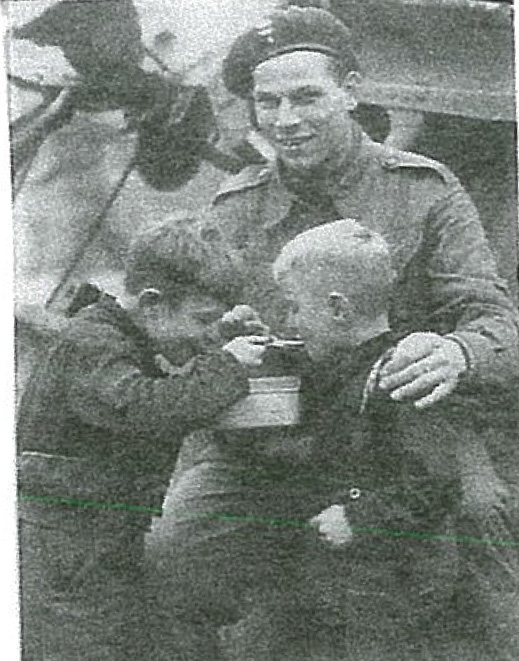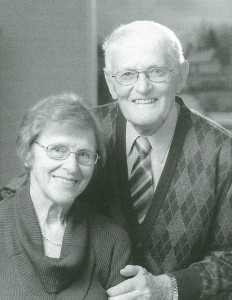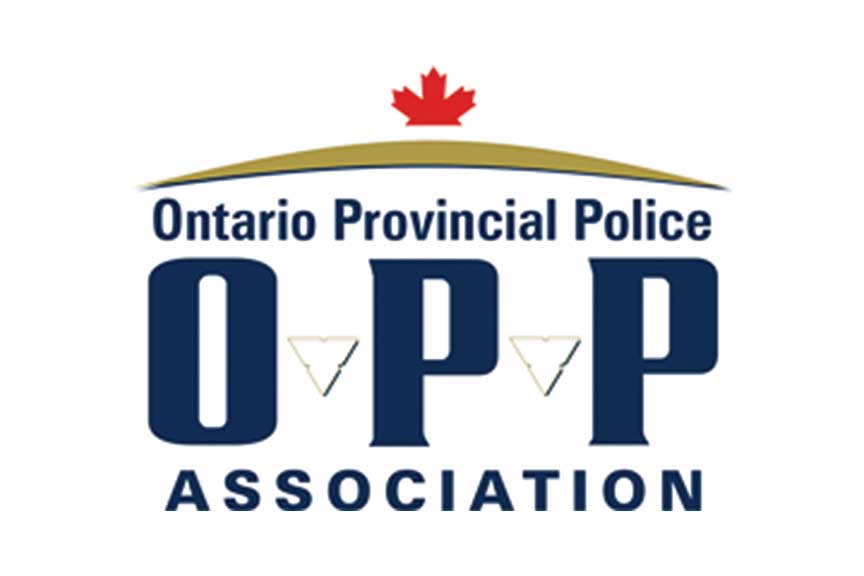EDITOR’S NOTE: Ann Zylstra was born in the Netherlands near the German border. She was seven-years-old at the beginning of WWII. After the war in 1949 she came to Canada with her family and settled in the St. Thomas area. Ms. Zylstra and her husband Dennis owned a dairy farm in Oxford County for several years prior to moving to Manitoulin Island in 1987. She worked at the Stratford and Mindemoya Hospitals as a registered nurse until her retirement. Ms. Zylstra has a BA in Religious Studies from Laurentian University. The following is an account of the liberation of her village and of the family’s emigration and settlement in Canada. It first ran in the pages of The Expositor on May 15, 2013. Some additions have been made on this 70th anniversary of VE Day.
by Ann Zylstra
The German occupation of the Netherlands dragged on into its fifth year. The winter of 1944-45, with the terrible cold weather and record snowfall that left uncounted people dead of hunger and disease and cold, was now passed and the weather turned into a beautiful spring with lots of sunshine.
D-Day, June 6, 1944, when 160,000 Allied troops stormed the beaches of Normandy was already almost a year ago, and the hope that the war would be over in a short while was very nearly gone. And in September 1944 the news broadcast from England over the illegal radio told that fierce fighting was taking place around Amhem between the allied troops and the Germans (the battle on which the movie ‘A Bridge Too Far’ is based) where the Allied army was to secure the bridges over the rivers so that they could advance north, became surrounded by the Germans and were forced to retreat and lost so many of their troops, caused the war to last through the terrible cold and snowy winter were people starved and froze to death.
Our village of Buinen was liberated Apri1 12, 1945. It was a beautiful day. We heard the Allied army coming across the fields with their armored personal carriers and their guns blazing already the day before and were waiting; not knowing what was to happen. Now they were here and shooting and throwing grenades at we did not know what. The whole village population seemed to be outdoors waiting and running back into the house hiding. Mothers had a difficult time trying to keep their children from running out to meet the oncoming army. My father made a shelter by digging a trench in the garden behind the hedge. The shelter would not have protected us from anything but then father did not know what we had to be protected from. Mother and I and my little sister and three little brothers and our dog Tippy huddled in the trench behind the hedge. The rest of the adults, my father and the food beggars from Amsterdam and the German army deserter who all stayed at our house, were watching the battle from the horse stable in the back of the house. Tippy escaped and ran up to the tanks and barked at the guns.
The sound of the guns and the grenades was deafening. But by late afternoon the war was over and the Allied soldiers parked their vehicles under the trees beside the village street and rested in the grass. It was time for their supper and they began to eat their food which smelled very appetizing. The children came around to inspect their vehicles and looked at their food with big round eyes. The soldiers saw how hungry the children were and shared or even gave all their food to the kids who ate with great speed. The soldiers shared chocolate bars and soda crackers and many children had a big tummyache after all that unaccustomed eating.
The soldiers had liberated our village, but not without cost. One Allied soldier was killed. He was Polish and was buried in our village. One little boy who wondered into the field of battle was killed also and the soldiers were devastated about this pure accidental death. One farm house was burned down and the milk factory lost all its windows. Houses throughout the village had broken windows as well. Some streets were damaged with large craters and many potholes. Six German soldiers also were killed.
Even though our village was liberated April 12 it took a few more days for the next village to be free as the Allied army, consisting of Canadians, met with fierce resistance. The army went from village to village, but the enemy had already fled from some areas. And of course the war was not over until May 5 1945 or May 8 when Germany officially surrendered. After that day there was no more need for blackouts and curfews. The flags were taken out of hiding and hung out of windows and from flagpoles. Some were a bit moth eaten and wrinkled from the long period spent in the comer of the attic. In due time Queen Wilhelmina and her parliament came home from England and Princess Juliana and Prince Bernhard brought their family from Ottawa with a new baby, who was born in Ottawa.

There were parades and towns and villages were decorated with arches with greenery and flags and there was dancing in every dance hall. The “onderduikers,” the partisans who were hiding from the gestapo and the collaborators appeared on the street in broad daylight. Some of those were only 16 when they refused to work in the slave labour camps and ammunition factories of the Nazis, and spent their teenage years in hiding, away from families and parents.
The partisans were extremely angry with the collaborators, people who persecuted and betrayed their own neighbours, and caused them to be killed or transported to one of the slave labour and death camps operated by the Nazis. The partisans picked them up at gunpoint and took them to the local schools and beat them with their guns and fists and sticks and chased them around the school yard that had a high chainlink fence around it. The children of the communities watched as these activities took place. Queen Wilhelmina sent an urgent message from London to the partisans and ordered them to stop these acts of revenge. The collaborators were then taken to the camp Westerbork, which was a gathering place for the Jews who were sent from that camp to their final destination. The collaborators were legally tried and convicted according to their crimes.
Once the festivities were over and the flags were put away and the arches and other decorations were discarded nothing had really changed in the daily lives of the Dutch people. Bread was still made from ground peas and sawdust and everything was still rationed and nothing was available in the stores. The country was in ruins and the population was sick and malnourished and in mourning for all the relatives and friends they had lost. They had no clothes and their belongings were either appropriated by the Nazis or traded for food and heating material and clothing. Some people were black marketers and robbed their own neighbours and friends and became rich.
After the war the Netherlands experienced a severe housing shortage as well as looking forward to reconstruction of infrastructure such as roads and bridges and some of the agricultural areas that were flooded by the Germans to hamper the Allied army from travelling to parts of the country. And the jobs and positions held by the partisans at the beginning of the war were taken by others and so the folks who did much for the country during the war were left with nothing as well as being unemployed. Emigration became the topic of conversation and people became interested in leaving the country altogether, to start a new life in Canada or Australia.
I learned that emigration means leaving a country as an emigrant and immigration means entering a country as an immigrant, not as a visitor. In order to immigrate to Canada a family had to apply to the appropriate organization and had to go to den Hague to be examined by a Canadian emigration doctor and have a roentgen photo, that is a chest X-ray, taken. Every member of the family was to be examined as the Canadian government did not want sick and disabled people even if they were children, in the country. In 1948 the prospective immigrants also had to be in agriculture and they needed a sponsor, who was a farmer for whom they had to work for one year. They also had to pay their own travel expenses, and were allowed to take $500 out of the country and if there was any money left over that had to be invested or held on deposit.
The family was also allowed to obtain or build a ships container for their furniture and other household goods and clothing. They were also allowed to buy additional items, but they were not allowed to take funds out of the country. The wages were $75 per month for a married man plus living accommodation for the family and $45 per month for a single man. Women did not count.
They were kept at home to look after their families. And girls found work in the tobacco factory or as a maid.
My father’s brother and brother-in-law immigrated to Canada with their families in 1948 and they urged my parents to apply for the necessary papers and passports. My uncles would find a sponsor for our family. My uncle Jan had a great imagination. He wrote that in Canada a farmer would be able to buy his own farm in no time at all. The streets in Canada were paved with gold.
And furthermore even though he lived in Aylmer, the family could hear the roar of the water as it came down the Niagara Falls, 400 kilometres away.
Since my father did not see a great future in the Netherlands he convinced my mother that they should also go to Canada with their six children. I was the oldest at 16 and my little sister was two-years-old and my three brothers and I sister were of school age. We did not know how to speak English and we were very poor. While we were waiting for all the documentation and a few trips to the emigration offices in Rotterdam, which is some 220 kilometres from our village, my parents sold the house and had an auction sale and even my piggybank was opened up to gather the money together for the trip across the ocean. We only took with us what we could carry, just a few suitcases with some clothes and pictures and my mother’s sewing machine. And the Marissen family was on their way to lands unknown.
My grandfather was very upset to see another one of his children go to that faraway land infested with heathens and wild Indians And furthermore how is God going to understand you if you are going to pray in English. And there was no hope of seeing us again.
The journey from our village to Aylmer was very long and tiring. Our journey began on September 23, 1949 when the family travelled to Rotterdam (220 kilometres) and boarded a train to Paris. The next day there was a special train to Le Havre to take us to the Scythia, a beautiful luxury ship from the Cunard liners based in England, which was to take us to Canada. We travelled steerage, the men in one large room with bunks and the women and children in another room. The women were to take care of however many children there were in the family. None of our family became seasick and we were able to enjoy the good food and the white bread we had not seen in many years, although we did not know what to do with the dry flakes we were to eat for breakfast. And since we did not know a word of English, the waitresses had much difficulty explaining to us that we were to add milk and eat the flakes. They were called cornflakes.
We arrived in Quebec on October 3 for an overnight stay and the next morning we boarded a train to take us to Aylmer, which was approximately 500 kilometres through the forest. The weather was beautiful and the colours were at their best. But we did not have a comfortable place in the train because we missed the one we should have taken and this train took us if we wanted to travel in the caboose. Not knowing the language and also not knowing how far it was to Aylmer, my father decided that we could sit in the caboose with the engineers and a toddler and our suitcases and no food. The trip took two days. I don’t remember if there was a dining car on the train or if it was not even a passenger train.
In due time we arrived in Aylmer and my uncle Jan picked us up from the train station with his old pickup truck. Mother and baby sister went in the cab and the rest of us travelled in the box of the truck. The road was extremely dusty but we arrived at my uncle’s very big farm house with no conveniences but tante Antje had food ready for us, and we were their guests until we swept out the house we were to live in and bought some second hand furniture and bedding and household stuff and some food for our family so that we could move into the house and finally be at home. My father had enough money left over from the $500 that he could bring into the country to buy a car. I think it was a 1928 Chevrolet. He started working for our boss and sponsor on November l, 1949. Now we were truly immigrants.
My father’s sponsor was very good to him. He gave him $80 instead of the $75 minimum wage and dad brought home a container with milk every evening. The house was not much but the roof did not leak and it was not too terribly drafty. His first holiday was November 11 when he came home after milking in the morning and both dad and mom were very worried. They thought that maybe the farmer did not want dad to come anymore, but they did not know that it was Remembrance Day.
Many Dutch immigrants had already moved into the area. There were no social services or health insurance in those days. The Christian Reformed Church with their headquarters in Grand Rapids, Michigan sent ministers out to the various areas of Ontario and I think perhaps even through Canada to assist the Dutch Reformed people with the settlement in their new country. They were called home missionaries, and could speak Dutch and besides preaching on Sunday they took folks to the doctor or the dentist and spoke to the boss for the immigrant worker if a misunderstanding arose or the boss was taking advantage of the worker. They also taught the newcomers the English language in the Sunday worship service by using English and then translating the same statement in the Dutch language. He would also sing a few lines of the hymns and we would repeat the lines after him. The congregation in Aylmer held their worship services in the basement of the Baptist Church in Aylmer. The church was very important for the young people as well. There were 35 young people in the group and we met each Sunday evening in someone’s home and played games and sang hymns in English.
Not to know the English language was the biggest obstacle of the whole venture. We had difficulty shopping and my mother would sniff the boxes and guess what was in them. The men who were out working with English speaking folks learned faster than the women who were at home taking care of the families. I got a job sorting out tobacco leaves and stood at a table with some other women. The radio was going all day long and since so much was repetitious and soap operas were easy to follow, I learned some English as well. And if anyone said something and you did not understand, the person would talk louder and shout rather than talk slower and with fewer words.
The next summer I started working as a nurse’s assistant (a forerunner of the RNA which is now RPN) in the extended care unit of the general hospital in St. Thomas. It was a wonderful job for me since I wanted to be a nurse all my life. The registered nurses were very nice and taught me all sorts of things such as sterile technique, and I was allowed to do sterile dressings and how to sharpen needles and to convert pills into liquid on a Bunsen burner to be drawn up into a syringe. And how to make a beautiful hospital bed with the sheets tight and mitered corners, as well as taking care of the aged and infirm. The food trays had to be carried from the kitchen. In the evening the heavy wooden sideboards had to be carried out of storage and tied to the beds to prevent the patients from falling out of bed and carried back to the storage room in the morning. Each nurse’s assistant had four patients to look after so there was lots of time for interaction. My wages of $1 per day plus room and board were very important to my parents since every cent had to be saved for the farm that was to be bought in the near future.
My parents bought their farm in 1952. It was a rundown place and my dad was not familiar with the heavy clay soil in Talbotville, close to St Thomas, so the farming business was not successful. He started working for the waterworks park in St Thomas and he loved the flowers and the gardening. He was a leader in the Christian Reformed Church in St. Thomas and wrote poems and essays and speeches for the men’s society for many years until the younger generation thought he was too old-fashioned. Both my parents learned to speak and read the English language very well.
Only one of my brothers and sisters was able to finish high school, but some of us became mature students. My brother Henry Marissen was ordained as a church minister at age 45 and went on to earn has Doctorate in Divinity. I finally became a registered nurse at age 49.
I met my husband Dennis Zylstra at the young people’s gatherings and we were married in 1952. He worked in construction for 10 years where he worked 60 hour weeks, and then we started our major project in our life which was our dairy farm were we seemed to work 24 hour days. We have five children: three daughters and two sons and 13 granddaughters and five grandsons.

Having five children in eight years seemed like a lot, especially when there were no daycare centers and no kindergarten, but as they grew older and went to school there were many extracurricular activities they had to be ferried to: church joy club, music lessons, home making 4H, calf 4H, driver’s training, choir practice, band practice, until they began to drive themselves which was even more hair raising. The children also had to help with the farming chores. From the five children, four finished high school and received a post-secondary education and the last child was married in 1984.
Would we have been able to help our kids along if our parents had not taken us to Canada? Not very likely. We became Canadian citizens in 1955 after the customary five-year waiting period, and were never homesick for Holland. But the Dutch culture stayed with us and some even transferred to our grandchildren, and we still speak Dutch as well as the local dialects we grew up with. We are also proud and thankful for the opportunities Canada offered us and our family.





